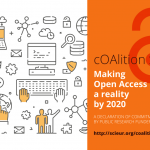This week, we listen to Ben Goldacre talk about the software platform OpenSAFELY. We prepare for the 2024 Open Data Day celebrations and highlight an upcoming webinar from ASAPbio about the global adoption of preprints. Finally, we read a review of the societal impact of open science, and we read about the expansion of a partnership between Taylor & Francis and The Wikipedia Library.
To listen to:
OpenSAFELY: a patient data concierge via BBC Sounds | 9-minute listen
In our recent guest blog post by Elizabeth Lloyd-Owen of use MY data, we learned how patient data held by the UK National Health Service (NHS) could be used to improve health outcomes. OpenSAFELY is a secure, transparent, open-source software platform that facilitates the use of data held within NHS records. In this podcast, Ben Goldacre (Professor of Evidence-Based Medicine and Director of the Bennett Institute for Applied Data Science at the University of Oxford) tells BBC More or Less how OpenSAFELY allows researchers to analyse patient data in a way that is transparent and reproducible but still maintains patient privacy.
To engage with:
Open Data Day 2024 via Open Knowledge
Open Data Day is an annual celebration of open data led by the Open Knowledge Foundation. From 2 to 8 March 2024, independent events around the world will explore how open data can support the achievement of the United Nations Sustainable Development Goals (SDGs). Join in by registering your own Open Data Day event or by attending one of more than 200 events already registered.
The globalization of preprints via ASAPbio
Join Ludo Waltman (Scientific Director and Professor of Quantitative Science Studies at Leiden University) and ASAPbio on 19 March to explore regional perceptions of preprints and challenges to their adoption around the world. Registration for this event is free.
To read:
Reviewing the impact of open science via SocArXiv Papers | 22-minute read
In this systematic review, the authors explore evidence for the societal impact of different aspects of open science. They reviewed 196 studies and found that the majority of available evidence relates to the impact of citizen science, with relatively little evidence available about the impact of open access, open code and open science more generally. The authors conclude that more research is needed to explore the societal impact of these other areas of open science.
Taylor & Francis expand Wikipedia partnership via Taylor & Francis | 3-minute read
Articles on Wikipedia – the online encyclopaedia that is an exponent of online knowledge and information sharing – are curated by a global community of volunteer editors. In an expansion to an existing partnership between The Wikipedia Library and Taylor & Francis, all active Wikipedia editors will now have access to more than 3 million articles published in Taylor & Francis journals. The collaboration aims to support the free dissemination of robust, peer-reviewed research to the public.
Enjoy reading our content? Then make sure to follow us on Twitter/X and LinkedIn for regular updates!






